In another sign of concern over economic recovery and the pace of foreign investment after the July 2015 nuclear deal, Iran’s State media is featuring a report that the “US government has thwarted many funding projects and deals…during the past months”.
Interestingly, Press TV turned to Arab media — normally treated with disdain by Tehran’s State outlets — to cite disappointment over the lack of European investment and banking deals.
As soon as the implementation of the nuclear agreement was announced in January 2016, Iran began to hail the ties with Europe, with President Rouhani visiting France and Iran and European countries sending delegations to Tehran. Agreements were announced in sectors such as transport and energy, and the Islamic Republic headlined the deal to purchase 118 planes from France’s Airbus — later complemented by 80 from Boeing — reviving Iran’s passenger fleet.
However, many of the deals have failed to materialize. Iran’s banks still face problems because of Washington’s financial restrictions, making the finance of investment and trade difficult. The Airbus and Boeing deals appear to have stalled, with only a couple of smaller Airbus jets delivered to Tehran so far. The flagship Iran Petroleum Contracts to boost oil production have been hindered by internal wrangling as well as hesitancy of foreign companies.
London-based Asharq al-Awsat summarized that European investors have given up on projects because of concerns over ongoing US sanctions through the Treasury’s Office of Foreign Assets Control.
One French banker said operations in Iran were held up after $15 billion in penalties imposed on BNP Paribas, Crédit Agricole, and Societe Generale Bank Jordan.
A German banker explained:
Most of the business visits by German, French and Swiss delegations to Tehran since the lifting of sanctions went in vain.
There is a serious concern among huge western banks because they don’t want to take the risk.
Iran’s Economy Minister Ali Tayyebnia hosted French counterpart Michel Sapin in Tehran on Saturday and later said:
The French finance minister invited the Head of Central Bank of Iran, Valiollah Seif, to pay a visit to Paris and explore ways of promotion of ties with France’s central bank. We have talked about Iran’s effective steps for reforming the banking system and establishment of anti-money laundering regulations.
In another sign of the difficulties, Iranian officials acknowledged this weekend that the French energy giant Total has deferred a decision to proceed with a key gas project until the Trump Administration’s position on sanctions and foreign investments is clear.
“This company has announced that it is waiting for US’ final decision and we understand it,” Deputy Oil Minister Amir-Hossein Zamaninia told a conference in Tehran.
Total had signed a basic agreement to invest $4.8 billion in the Phase 11 development of Iran’s South Pars gas field. Iranian officials denied reports last month that the French company was stepping back because of its sanctions concerns.
The promise of economic revival is likely to be the leading issue in Iran’s Presidential election in May. Seeking a second term, Hassan Rouhani is hailing 5% growth and saying that it will be 6% next year, in part because of the impact of the nuclear deal. His hardline and conservative opponents, yet to agree on a challenger, are already declaring Rouhani’s failure over unemployment and claiming corruption among his inner circle.
See Iran Daily, March 4: Conservatives Seek Unified Challenge to Rouhani
Tehran Friday Prayer Warns Reformists Over Election
The Tehran Friday Prayer leader, Ayatollah Ahmad Khatami, has warned reformists not to challenge the Iranian system in their electoral campaign.
Khatami told worshippers:
The election space in the country should not be a space to vent about Islamic values. No one – neither candidates nor their supporters – has a right to persecute the Islamic political system under the pretext of campaign speeches, nor raise questions about the Islamic Revolution’s 38 years of service.
The cleric then referred to those detained after the disputed 2009 Presidential election, including opposition leaders Mir Hossein Mousavi, Mehdi Karroubi, and Zahra Rahnavard: “Until the seditionists repent, the people will not reconcile with them.”
Mousavi and Karroubi — both candidates in the 2009 ballot “won” by Mahmoud Ahmadinejad — and artist and academic Rahnavard, who is Mousavi’s wife, have been held under strict house arrest since February 2011.
Khatami asserted that the “atmosphere” surrounding Iran’s forthcoming presidential elections “must be different from that which surrounds Western elections; you see what a mess the American [presidential] campaign arena was”. He added, “Our priority in the elections must be to prioritize the glorious presence of the people at the ballot box, regardless…of what faction wins the elections.”
TOP PHOTO: Iran’s Economy Minister Ali Tayyebnia and Germany’s Vice Chancellor Sigmar Gabriel exchange economic agreements, October 2016

